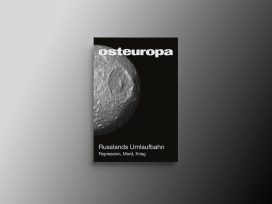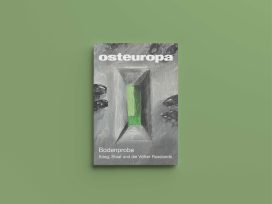Abstracts Osteuropa 9/2006
Dmitrii Furman
The origins and elements of imitated democracies. On political developments in the post-Soviet space
Russia’s political system is not unique. Throughout the territory of the former Soviet Union, diverse regimes have established themselves behind a democratic façade while concentrating power in the hands of each respective president. A comparison of the eastern Slavic states with those of Central Asia and the Caucasus shows not only that these imitated democracies have the same source, but that the one-man regimes also draw on the same elements and practices of political rule. Contrary to their purported power and stability, they are dysfunctional in their claims of control, their means of creating legitimacy and their socio-economic productivity. They all contain the seeds of their own downfall.
Petra Stykow
Society as a state event? Trade associations and the State in Russia
Trade associations are seldom viewed as relevant political players in Poland; based on the empirical evidence, however, this assumption should be differentiated: For one, the potential of such associations depends largely on the framework of opportunity granted by the state, and as the past two decades show, this potential is in this regard subject to change. For another, these associations represent a specific means of influencing the complex network of persons, cliques, and organizations that determine the political process in Russia. Putin’s strategy of authoritarian modernization brings with it the manifest danger of producing a dysfunctional nationalized form of social interest-group representation.
Jens Siegert
The pipeline, the protest, and the president. A Siberian lesson on the Putin system
Russia is planning an oil pipeline from eastern Siberia to the Pacific coast that will run close to Lake Baikal. The project has run up against opposition for several years. Now President Putin, in a decision staged for television, has relocated this section of the pipeline. This does not reveal a trend towards a democratic about-face in Russia. Putin’s intervention is more like a didactic play about a political system in which state and society stand irreconcilably opposite one another and the president as the “good Tsar” boosts his legitimacy by dressing down high-ranking state functionaries or business leaders on television for all to see.
Hans-Georg Wieck
Democracy promotion at a dead end. Europe is failing in Belarus
With the Charter of Paris, the Conference for Security and Cooperation in Europe laid the foundation for a democratic community of values in Europe. But the transformation to democracy in eastern Europe has ground to a halt. Doctrines of a “strong state” and “managed democracy” are thriving. In Belarus, the authoritarian regime of Aleksandr Lukashenka has rejected every kind of reform efforts. The European Union’s rhetorical expressions of solidarity with the country’s repressed democratic movement are not enough. What is required is a pro-active support of democratic alternatives to this form of authoritarian unconstitutional rule.
Olaf Leiße
Politics on the other side of Lake Baikal. Multi-ethnicity in the Buryat Republic
The Buryat Republic is one of the multi-ethnic regions of Russia where no national conflict flared up during the collapse of the Soviet Union. Despite the existence of a relatively significant minority, there are to this day no noteworthy ethnically loaded social and political tensions in Buryatiya. Ethnic orientations play an important role mainly in the private sphere. This is due in part to a regional political system that contains a strong element of concordance. Overall, it has largely managed to limit the significance of ethnicity to the private, non-public sphere.
Stefan Auer
The lost treasure of the revolution. Hannah Arendt and the revolutions of 1956, 1968, and 1989
Hannah Arendt spoke of the Soviet empire’s crisis of legitimation astonishingly early. This far-sightedness, however, was accompanied by short-sightedness in observing contemporary events in communist eastern Europe. She played down somewhat the bloody events of the Hungarian Uprising in 1956. She wrote about them as if she had in mind what happened only in 1989. Nevertheless, Arendt’s theoretical findings regarding the relationship of power and force are crucial for understanding the Hungarian popular uprising as well the political significance of this event in the collective memory both back in 1989 and to this day.
Werner Hennings
Disturbed for a long time. Environment, economics, and society in the brown coal district of North Bohemia
In the North Bohemian brown coal district, the people’s quality of life has clearly improved since 1989. Air and water are cleaner; life expectancy has increased. On the other hand, unemployment, especially among the young and those over 50, has risen sharply in the past decade and a half. In terms of ecology, the residual pollution of heavy industry has yet to be overcome. The mining of brown coal continues, and the spread of suburbia is taking up more and more space. Uncontrolled settlement is forcing environmentally hazardous mobility.
Andrea Zink
Playing with history. Boris Akunin’s thrillers
Why are Boris Akunin’s thrillers selling so well? Akunin knows the Russian readers’ needs: their passion for the criminal novel, their interest in their own history. This dual demand suits Akunin fine. He writes historical thrillers, employing the techniques of postmodernism. In effect, a new view of old times emerges – a Russia stripped of its melancholy and the national search for meaning.
Winfried Schneider-Deters
“A bird of paradise among vultures”. The metamorphosis of Yulia Tymoshenko
Yulia Tymoshenko has become a legend. Fact and fiction can hardly be separated. As the only woman among numerous uncouth and partly shady men at the levers of power, she looks back on a dual career in Ukrainian business and politics. A now available biography sheds light on facets of her dazzling personality, her unique development from oligarch to revolutionary and “champion of justice” to whom the Ukrainian people increasingly ascribe credibility.
Published 9 October 2006
Original in German
Contributed by Osteuropa © Osteuropa
PDF/PRINTNewsletter
Subscribe to know what’s worth thinking about.



